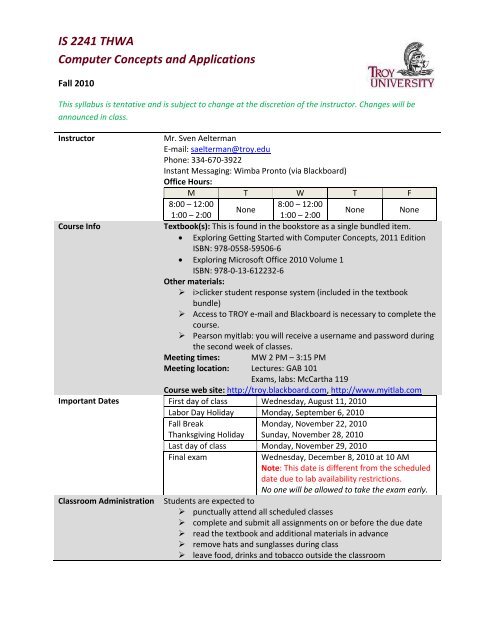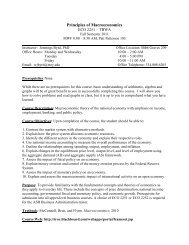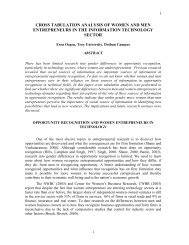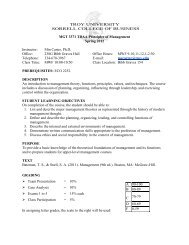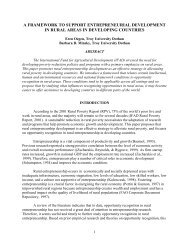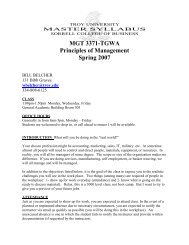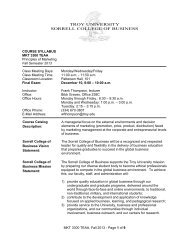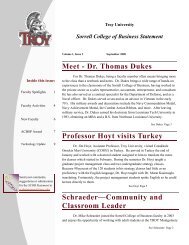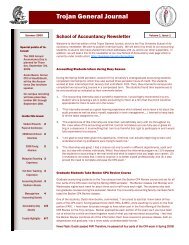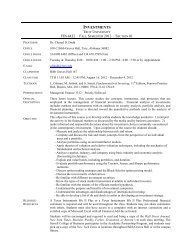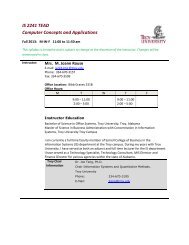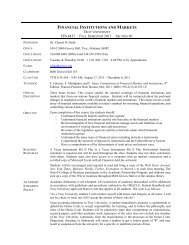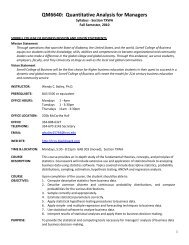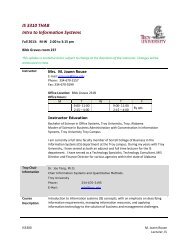IS 2241 THWA Fall 2010 Syllabus - Sorrell College of Business ...
IS 2241 THWA Fall 2010 Syllabus - Sorrell College of Business ...
IS 2241 THWA Fall 2010 Syllabus - Sorrell College of Business ...
You also want an ePaper? Increase the reach of your titles
YUMPU automatically turns print PDFs into web optimized ePapers that Google loves.
<strong>IS</strong> <strong>2241</strong> <strong>THWA</strong><br />
Computer Concepts and Applications<br />
<strong>Fall</strong> <strong>2010</strong><br />
This syllabus is tentative and is subject to change at the discretion <strong>of</strong> the instructor. Changes will be<br />
announced in class.<br />
Instructor<br />
Mr. Sven Aelterman<br />
E-mail: saelterman@troy.edu<br />
Phone: 334-670-3922<br />
Instant Messaging: Wimba Pronto (via Blackboard)<br />
Office Hours:<br />
M T W T F<br />
8:00 – 12:00<br />
8:00 – 12:00<br />
None<br />
1:00 – 2:00<br />
1:00 – 2:00<br />
None None<br />
Course Info<br />
Textbook(s): This is found in the bookstore as a single bundled item.<br />
Exploring Getting Started with Computer Concepts, 2011 Edition<br />
<strong>IS</strong>BN: 978-0558-59506-6<br />
Exploring Micros<strong>of</strong>t Office <strong>2010</strong> Volume 1<br />
<strong>IS</strong>BN: 978-0-13-612232-6<br />
Other materials:<br />
‣ i>clicker student response system (included in the textbook<br />
bundle)<br />
‣ Access to TROY e-mail and Blackboard is necessary to complete the<br />
course.<br />
‣ Pearson myitlab: you will receive a username and password during<br />
the second week <strong>of</strong> classes.<br />
Meeting times: MW 2 PM – 3:15 PM<br />
Meeting location: Lectures: GAB 101<br />
Exams, labs: McCartha 119<br />
Course web site: http://troy.blackboard.com, http://www.myitlab.com<br />
Important Dates First day <strong>of</strong> class Wednesday, August 11, <strong>2010</strong><br />
Labor Day Holiday Monday, September 6, <strong>2010</strong><br />
<strong>Fall</strong> Break<br />
Thanksgiving Holiday<br />
Monday, November 22, <strong>2010</strong><br />
Sunday, November 28, <strong>2010</strong><br />
Classroom Administration<br />
Last day <strong>of</strong> class Monday, November 29, <strong>2010</strong><br />
Final exam<br />
Wednesday, December 8, <strong>2010</strong> at 10 AM<br />
Note: This date is different from the scheduled<br />
date due to lab availability restrictions.<br />
No one will be allowed to take the exam early.<br />
Students are expected to<br />
‣ punctually attend all scheduled classes<br />
‣ complete and submit all assignments on or before the due date<br />
‣ read the textbook and additional materials in advance<br />
‣ remove hats and sunglasses during class<br />
‣ leave food, drinks and tobacco outside the classroom
Assessment and Grading<br />
Course Catalog<br />
Grade distribution:<br />
A<br />
90% and up<br />
B 80% - 89.9%<br />
C 70% - 79.9%<br />
D 60% - 69.9%<br />
F Below 60%<br />
Assessment methods:<br />
Exam 1 – Computer Concepts 12.5%<br />
Exam 2 – Word 12.5%<br />
Exam 3 – Excel 12.5%<br />
Exam 4 – PowerPoint 12.5%<br />
Final Exam (Comprehensive) 25%<br />
Homework, in-class assignments 15%<br />
Attendance/Participation 10%<br />
Test policy:<br />
Make-up exams will only be given for unforeseen excused absences (see<br />
Attendance policy). Make-up exams must be completed within one week<br />
<strong>of</strong> the student’s return to class after the excused absence.<br />
You are expected to turn <strong>of</strong>f all electronic devices prior to entering the<br />
exam location. Using any electronic device (in any manner) will be<br />
considered cheating and will be handled according to the Cheating Policy<br />
outlined above. This includes translators.<br />
Description:<br />
This course provides an interdisciplinary introduction to microcomputer<br />
literacy, word processing, spreadsheets, database, business graphics and<br />
the Internet.<br />
Objectives:<br />
1. List and describe the hardware and s<strong>of</strong>tware components <strong>of</strong> a<br />
computer system.<br />
2. Maintain file systems, and run applications.<br />
3. Use a word-processing application to create, modify, save, and<br />
preview fully featured, academically formatted documents.<br />
4. Use an electronic-spreadsheet application to create, save, modify,<br />
and preview a fully featured, multiple-sheet workbook.<br />
5. Use a presentation s<strong>of</strong>tware package to create, save, modify, and<br />
show a multiple-slide presentation using various templates, designs,<br />
formats, objects, headers, footers, and animation and transition<br />
schemes.<br />
6. Use a database package to create, save, populate, maintain, and<br />
query a database and to produce formatted reports.<br />
Purpose:<br />
To develop the computer skills necessary for satisfactory performance in<br />
upper-level business courses, and to encourage further development <strong>of</strong><br />
skills for effective participation in business organizations. Prerequisite for<br />
admission into upper-level business courses.
Attendance Policy<br />
Cheating Policy<br />
Academic Dishonesty<br />
Incomplete Work Policy<br />
Homework Policy<br />
Attending class regularly contributes to success in this course. This policy is<br />
designed to encourage you to attend classes.<br />
1. Students who arrive after attendance is taken will be marked absent.<br />
2. Attendance is mandatory. If a student misses a class, s/he is still<br />
responsible for materials and information covered in that class.<br />
3. Students who miss NINE or more classes (whether excused or<br />
unexcused) will be asked to DROP this course.<br />
4. Excused absences: Excused absences have the following<br />
characteristics:<br />
a. Instructor was informed prior to the absence.<br />
b. Instructor determines that the absence is excused.<br />
c. Absence is <strong>of</strong> one <strong>of</strong> the following types:<br />
i. Participation in a documented <strong>of</strong>ficial University function that<br />
does not permit the student’s class attendance (e.g., athletic<br />
events, field trips, etc.)<br />
ii. Severe illness (this does not include scheduled medical<br />
appointments nor driving someone else to doctor), a hospital<br />
stay, or a doctor's excuse saying that it is impossible for<br />
student to attend class(es)<br />
iii. Death <strong>of</strong> immediate family member (grandparent, parent,<br />
sibling, or child)<br />
iv. Appearance in court (if mandatory)<br />
v. Personal situations that are approved by the instructor in<br />
advance <strong>of</strong> the time the student is to be absent.<br />
d. Written documentation (on letterhead) must be provided at the<br />
first class session after the student’s return to classes.<br />
If you are caught cheating or committing plagiarism as defined in the<br />
ORACLE: Student Handbook, 2008-2009, pp. 48-49, your grade for the<br />
exam/assignment will be reduced to zero, your grade for the course could<br />
be reduced to an “F”, and you could be “suspended from the university for<br />
a specific or an indefinite period.”<br />
Any incomplete work at the end <strong>of</strong> the term will not be accepted, unless<br />
the student provides documentation and obtains approval from the<br />
instructor prior to grades being submitted to the Registrar.<br />
Assignments must be submitted online using Blackboard. No other method<br />
<strong>of</strong> submission will be accepted unless approved by the instructor in<br />
advance.<br />
If you can access your assignment from Blackboard, then the instructor<br />
should be able to access it as well. There is no need to ask if an assignment<br />
is received.<br />
Hands-on assignments take considerable time to grade. Do not ask for your<br />
grade. As soon as grading is completed, your grade will be available on<br />
Blackboard.
Additional Services<br />
Electronic Devices Policy<br />
<strong>Sorrell</strong> <strong>College</strong> <strong>of</strong> <strong>Business</strong><br />
Mission Statement<br />
<strong>Sorrell</strong> <strong>College</strong> <strong>of</strong> <strong>Business</strong><br />
Vision Statement<br />
Troy University Mission<br />
Statement<br />
Troy University supports Section 504 <strong>of</strong> the Rehabilitation Act <strong>of</strong> 1973 and<br />
the Americans with Disabilities Act <strong>of</strong> 1990, which insure that<br />
postsecondary students with disabilities have equal access to all academic<br />
programs, physical access to all buildings, facilities and events, and are not<br />
discriminated against on the basis <strong>of</strong> disability. Eligible students, with<br />
appropriate documentation, will be provided equal opportunity to<br />
demonstrate their academic skills and potential through the provision <strong>of</strong><br />
academic adaptations and reasonable accommodations. Further<br />
information, including appropriate contact information, can be found at<br />
the link for Troy University’s Office <strong>of</strong> Human Resources at<br />
http://www.troy.edu/humanresources/ADAPolicy2003.htm<br />
Per TROY Academic Operating Policy 8-1-07-08 (See<br />
http://www.troy.edu/academics/aop/documents/AOP_08-01-07-08.pdf):<br />
“Use <strong>of</strong> any electronic devise by students in the instructional environment<br />
is prohibited unless explicitly approved on a case-by-case basis by the<br />
instructor <strong>of</strong> record or by the Office <strong>of</strong> Disability Services in collaboration<br />
with the instructor. Cellular phones, pagers, and other communication<br />
devices may be used for emergencies, however, but sending or receiving<br />
non-emergency messages is forbidden by the University. Particularly, use<br />
<strong>of</strong> a communication device to violate the Troy University “Standards <strong>of</strong><br />
Conduct” will result in appropriate disciplinary action (See pp. 42-52 <strong>of</strong> the<br />
Oracle.<br />
In order to receive emergency messages from the University or family<br />
members, the call receipt indicator <strong>of</strong> devices must be in the vibration<br />
mode or other unobtrusive mode <strong>of</strong> indication. Students receiving calls<br />
that they believe to be emergency calls must answer quietly without<br />
disturbing the teaching environment. If the call is an emergency, they must<br />
move unobtrusively and quietly from the instructional area and notify the<br />
instructor as soon as reasonably possible. Students who are expecting an<br />
emergency call should inform the instructor before the start <strong>of</strong> the<br />
instructional period.”<br />
Through operations that span the State <strong>of</strong> Alabama, the United States, and<br />
the world, <strong>Sorrell</strong> <strong>College</strong> <strong>of</strong> <strong>Business</strong> equips our students with the<br />
knowledge, skills, abilities and competencies to become organizational and<br />
community leaders who make a difference in the global village and global<br />
economy. Through this endeavor, we serve students, employers, faculty,<br />
and Troy University at large as well as the local and global communities.<br />
<strong>Sorrell</strong> <strong>College</strong> <strong>of</strong> <strong>Business</strong> will be the first choice for higher business<br />
education students in their quest to succeed in a dynamic and global<br />
economy. <strong>Sorrell</strong> <strong>College</strong> <strong>of</strong> <strong>Business</strong> will create the model for 21st century<br />
business education and community service.<br />
Troy University is a public institution comprised <strong>of</strong> a network <strong>of</strong> campuses<br />
throughout Alabama and worldwide. International in scope, Troy<br />
University provides a variety <strong>of</strong> educational programs at the<br />
undergraduate and graduate levels for a diverse student body in<br />
traditional, nontraditional and emerging electronic formats. Academic<br />
programs are supported by a variety <strong>of</strong> student services which promote<br />
the welfare <strong>of</strong> the individual student. Troy University's dedicated faculty<br />
and staff promote discovery and exploration <strong>of</strong> knowledge and its<br />
application to life-long success through effective teaching, service, creative<br />
partnerships, scholarship and research.


